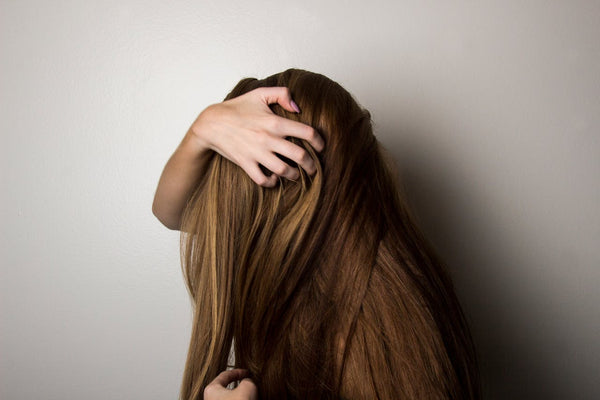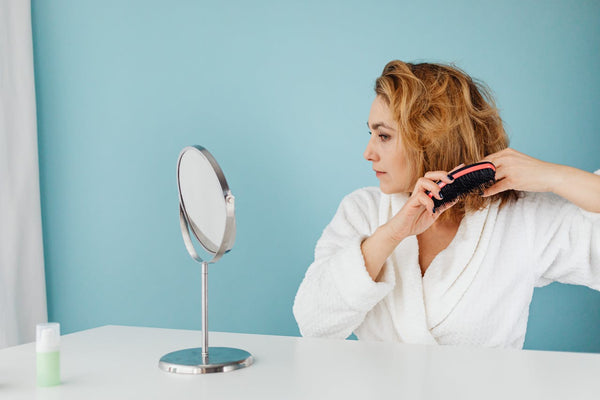How to Prevent Hair Fall: Expert Tips to Strengthen and Protect Your Hair

Hair fall can be distressing - especially when you start noticing more strands in your brush or shower drain. While some shedding is natural, excessive hair fall is often a sign that your scalp and hair need better care. From environmental stressors to lifestyle habits, several factors can weaken hair roots. Fortunately, by adopting the right haircare routine and nourishing your scalp from within, you can effectively minimize hair fall and promote stronger, healthier growth.
Common Causes of Hair Fall
1. Weak Hair Roots and Scalp Imbalance
A weakened scalp environment caused by product buildup, lack of moisture, or inflammation can make hair roots fragile, leading to excessive shedding.
2. Hormonal and Genetic Factors
Hormonal fluctuations, thyroid imbalances, and genetics can trigger patterned hair fall. While these factors can’t be eliminated entirely, consistent strengthening and scalp care routines can slow down the process.
3. Nutritional Deficiencies
Inadequate protein, iron, zinc, and vitamins like biotin and vitamin D can lead to brittle, weak hair that breaks easily.
4. Stress and Lifestyle
Chronic stress impacts hormone levels and blood circulation to the scalp, reducing nutrient delivery to hair follicles.
5. Heat Styling and Chemical Treatments
Overuse of hair dryers, straighteners, or color treatments weakens hair bonds, stripping away natural strength and elasticity.
6. Climate and Environmental Damage
High humidity, harsh sunlight, and pollution can dry out hair shafts and damage cuticles, leading to increased breakage and fall.
Effective Solutions to Prevent Hair Fall
1. Choose a Strengthening Shampoo
Use a mild, strengthening shampoo formulated to cleanse without stripping natural oils. Regular washing keeps the scalp clean and prevents build-up that can clog follicles. Look for ingredients that support scalp health and reinforce the hair structure.
2. Follow with a Fortifying Conditioner
Conditioning after every wash helps lock in moisture, reduce friction, and minimize breakage. Strengthening conditioners smooth the cuticle and restore elasticity, making hair more resilient to daily wear.
3. Incorporate a Leave-In Conditioner or Hair Serum
Leave-in conditioners and serums act as a protective shield against humidity, heat, and UV exposure. They help seal moisture, reduce frizz, and protect the hair shaft from external damage that leads to hair fall.
4. Use a Nourishing Hair Mask Weekly
A weekly leave-in or rinse-off hair mask replenishes deep hydration and nutrients. These treatments strengthen the internal structure of the hair, improving tensile strength and preventing breakage from within.
5. Scalp Massage for Circulation
Massaging your scalp for 5–10 minutes daily boosts blood flow, improves oxygen supply to follicles, and encourages new hair growth.
6. Manage Heat and Chemical Exposure
Limit the use of heat styling tools and chemical treatments. When styling is necessary, always apply a heat protectant to preserve your hair’s natural bonds.
7. Protect Hair from Environmental Damage
Wear a hat or scarf in strong sunlight and rinse your hair after swimming in chlorinated or salty water to prevent damage to follicles and strands.
Diet and Nutrition for Stronger Hair
1. Protein-Rich Foods
Hair is primarily made of keratin, a protein. Include lean meats, fish, eggs, legumes, and nuts in your diet to support healthy hair growth.
2. Iron and Zinc
Iron improves oxygen flow to the scalp, while zinc strengthens hair follicles. Incorporate spinach, lentils, seeds, and whole grains for optimal intake.
3. Vitamins A, C, D, and E
These vitamins aid sebum production, boost collagen formation, and enhance scalp health - critical for reducing hair fall.
4. Omega-3 Fatty Acids
Omega-3s found in walnuts, flaxseeds, and fish oil nourish hair follicles and reduce inflammation that can contribute to hair thinning.
5. Hydration
Drink sufficient water daily to maintain scalp hydration and prevent dryness-induced breakage.
Controlling Hair Fall Caused by External and Genetic Factors
1. Climate Control
Adjust your haircare routine with the seasons - use hydrating products in dry winters and lightweight, anti-humidity formulas during humid weather to reduce stress on your scalp.
2. Stress Management
Practices like yoga, meditation, and proper sleep help regulate hormonal balance and minimize stress-induced shedding.
3. Genetic or Hormonal Hair Fall
While genetics can’t be altered, early preventive care - regular scalp treatments, strengthening masks, and consistent nourishment - can slow progression and maintain density.
Final Thoughts
Preventing hair fall is about building a consistent, nurturing routine that strengthens hair from root to tip. With the right combination of strengthening shampoos, nourishing conditioners, leave-in products, and a balanced diet, your hair can regain resilience and fullness. Remember - healthy hair growth starts at the scalp, and daily care makes all the difference.
FAQ
1. How often should I wash my hair to prevent hair fall?
2–3 times a week is ideal to keep your scalp clean without stripping natural oils essential for hair strength.
2. Can leave-in conditioners help with hair fall?
Yes, leave-in conditioners reduce friction, improve moisture retention, and protect strands from breakage and daily stress.
3. What foods are best for reducing hair fall?
Foods rich in protein, biotin, omega-3 fatty acids, and iron—such as eggs, fish, nuts, and leafy greens - help reduce hair fall and support healthy growth.
4. Does weather affect hair fall?
Yes, humidity, pollution, and extreme temperatures can weaken hair cuticles. Protect your hair with serums or leave-in masks when exposed to harsh conditions.
5. Can I reverse genetic hair fall?
While genetic factors can’t be completely reversed, consistent strengthening care, scalp stimulation, and a nutrient-rich diet can slow down and manage the process effectively.



